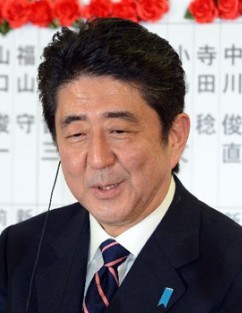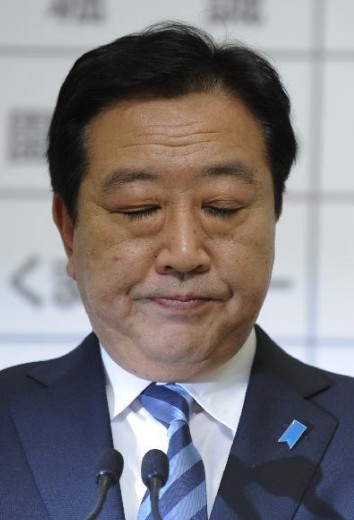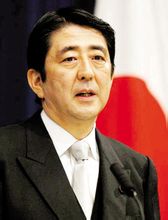LDP's Abe wins Japan's election
| Lastest News |
 |
●Japan shifts right as Abe set to win Japan's new leader is likely to make efforts to heal the frosty relationship with China considering its sluggish economic situation, while China should continue to keep a firm stance in response to potential frictions, analysts said on December 16 as the country held a general election. |
 |
●Noda quits from DPJ's presidency Leader of Japan's Democratical Party of Japan (DPJ), Yoshihiko Noda, said on late Sunday that he quits from the party's presidency. |
International congratulations to Abe:
Obama congratulates Japan's Abe on election victory
Cambodian PM greets Japan's Abe on landslide victory in general election
| Ruling Challenges |
Long-lasting political instability
Japan's political instability is featured by frequent changes of prime minister. The changes not only lie in conflicts and compromises between different parties, but are also rooted in different factions within a party. It will directly result in policy interruption.
Economic woes
The latest economic figures indicate that Japan is sliding into an economic recession. Affected by toppled external demand, particularly declines in European and Chinese markets, Japan's export-reliant economy is suffering great pressure. A strong yen also aggravates the situation.
Diplomatic dilemma
Territorial disputes between China and Japan have greatly impacted on bilateral trade as Japan's export to China, its largest trading partner and export market, has tumbled 11.6 percent.
Relations with the United States remain the core of Japan's foreign policies.
After the DPRK blasted off its rocket, the regional situation is more complex. Japan has to seek cooperation with China and South Korea to press the DPRK while it is still at odds with the two countries.
Abe's promises:
●Abe has emphasized that his party is committed to leading the country out of its economic troubles at the first official press conference.
●Abe has said he will visit the United States soon after he is appointed prime minster, showing his eagerness to improve Japan-US alliance relationship.
●Abe said that his party will improve Japan's relations with China as soon as passible.
| Media Comments |
GT editorial: Abe must be more than an angry leader
Abe knows better than anyone else about the complexity of the Diaoyu Islands dispute, but his speech did not deliver this nuance.
Abe can turn away from nationalism
We have reason to expect that Abe can use earnestness, courage and wisdom to once again lift Sino-Japanese relations from a low point. This will not only benefit Japan, but also the whole of the Asia-Pacific region.
CNTV commentary:The world wants to see a new Japan after elections
Only when the world sees a cool-headed and cooperative Japan can the country ease into the vast network of trade and investment in the Asia-Pacific, the most promising region in the 21st century.
Chinese media digest: Abe's win looms over future Sino-Japan relations
Abe's win aroused worldwide attention, including Chinese media, over the impact the hawkish leader will have on future policy and Sino-Japanese relations.
| Sino-Japanese Relations |
Abe's attitudes on Diaoyu Islands:
●Although Abe said he would like to improve relations with China and other countries, he added that the Senkaku Islands is Japan's sovereign territory, and he would never change this policy, according to NHK report.
●In a street campaign for the lower-house election on December 2, Abe said the LDP will commit to a strong Japan-US tie to safeguard its sovereignty on territorial disputes with China.
●In a speech in Tokyo on November 26, Abe proposed the necessity to consolidate "defense" of the Diaoyu Islands.
Abe government's attitudes on Sino-Japanese Relations:
●Relations with China important for Japan: Abe
Shinzo Abe, leader of Japan's Liberal Democratic Party (LDP), said here on December 17 that relations with China is one of the most important foreign relations of Japan.
●Abe says LDP to improve relations with China
Leader of Japan's Liberal Democratic Party (LDP) Shinzo Abe said on December 16 that his party will improve Japan's relations with China as soon as possible.
●My first job is to improve Japan-China relations: Japan's new ambassador to China
"Improving the bilateral relationship will be my top priority. It's big challenge for me," Japan's new ambassador to China Masato Kitera said in a recent interview with Chinese media at the Japanese Foreign Affairs Ministry.
Expert's opinion: Japanese new leadership's policy towards China
| Background |
| About Shinzo Abe | |
 |
Born: Sept 21, 1954 |
| Party: Liberal Democratic Party | |
| Political career | |
| Chief Cabinet Secretary: Oct 3, 2005 – Sept 26, 2006 | |
| President of the Liberal Democratic Party: Sept 20, 2006 – Sept 26, 2007 | |
| Prime Minister of Japan: Sept 26, 2006 – Sept 26, 2007 | |
| 6 Prime Ministers of Japan from 2006 to 2012 | |||
| Name |
Party |
Time in office | |
| Shinzo Abe |
LDP |
Sept 26, 2006 – Sept 26, 2007 | |
| Yasuo Fukuda |
LDP |
Sept 26, 2007 – Sept 1, 2008 | |
| Taro Aso |
LDP |
Sept 24, 2008 – Sept 16, 2009 | |
| Yukio Hatoyama |
DPJ |
Sept 16, 2009 – June 2, 2010 | |
| Naoto Kan |
DPJ |
June 8, 2010 – Aug 26, 2011 | |
| Yoshihiko Noda |
DPJ |
Sept 2, 2011 – Dec 16, 2012 | |
| Related Reports |
Related coverage:
Diaoyu Islands disputes
China, Japan and South Korea launched FTA negotiations
Related reports:
Abe to meet with Obama in January on ties
China ‘closely watching’ Japan following LDP election win
Limited, poor strategic vision impairs Japan in int’l arena
Diaoyu Islands dispute enters new stage
China defends sovereignty of airspace over Diaoyu Islands
China protests Japanese military aircraft trespass to airspace
Surveillance plane’s patrol over Diaoyu normal: FM